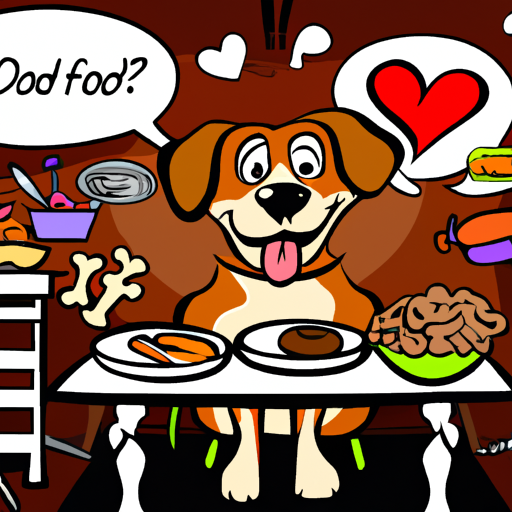It’s a question that, as a caregiver, you’ve probably asked yourself countless times: “Why does my dog seem to have an insatiable appetite for food?” Let’s dive deeper into this fascinating topic.
Understanding Your Dog’s Dietary Needs
Firstly, it’s important to understand that dogs are naturally food-driven creatures. Their ancestors, the wolves, are opportunistic eaters that would often have to go days without a meal.
- Protein: Dogs require a diet rich in protein. This is because, unlike humans who are omnivores, dogs are primarily carnivores. Their bodies are designed to metabolize proteins and fats as their main source of energy.
- Carbohydrates: While dogs do not require carbohydrates in the same way humans do, they can still utilize them as an energy source.
- Fats: Fats are another important part of a dog’s diet, providing the most concentrated source of energy.
| Nutrient | Importance |
|---|---|
| Protein | Primary source of energy |
| Carbs | Secondary source of energy |
| Fats | Concentrated source of energy |
The Role of Smell in a Dog’s Love for Food
Secondly, a dog’s sense of smell plays a crucial role in their love for food. Dogs have an incredibly sensitive olfactory system—much more so than humans—allowing them to detect a wide range of smells and aromas.
- Scent molecules from food stimulate their olfactory receptors
- The more aromatic the food, the more attractive it is to dogs.
The Psychological Aspect: Food as a Reward
Thirdly, consider the psychological aspect. From a young age, many dogs learn to associate food with reward, affection, and positive reinforcement.
- Treats are often used in training, creating a strong psychological association.
- Over time, dogs start viewing food as a symbol of love and care.
The Health Factor: Medical Reasons for Increased Appetite
Fourthly, it’s worth noting that sometimes, a dog’s excessive love for food might be rooted in medical reasons. Conditions such as diabetes, hyperthyroidism, and certain medications can increase a dog’s appetite.
- If you notice sudden changes in your dog’s eating habits, consult a vet.
- Regular check-ups can help identify and manage these conditions early.
Food Quality: The Impact of Nutrient-Rich Food
Lastly, the quality of food plays a significant role in how much a dog enjoys eating. Highly processed foods with artificial flavors and colors can be less satisfying for dogs, leading them to eat more.
- Opt for high-quality, nutrient-rich dog food.
- Homemade meals, when possible, can also be a healthier alternative.
Frequently Asked Questions
Q: Why does my dog seem to love human food more than dog food?
A: Dogs are attracted to the smell and taste of human food, which is often more varied and richer than dog food.
Q: Can dogs overeat?
A: Yes, dogs can overeat and this can lead to obesity and other health problems. It’s important to regulate your dog’s diet and ensure they are getting the right amount of food.
Q: What should I do if my dog is constantly begging for food?
A: Constant begging can be a sign of poor dietary balance or a behavioral issue. It’s best to consult with a vet or a dog behaviorist.
Remember, as a caregiver, your role is not just to feed your dog, but to ensure they get a balanced, nutritious diet that caters to their specific dietary needs. Understanding why dogs love food so much can help you navigate this journey with more compassion and knowledge.



